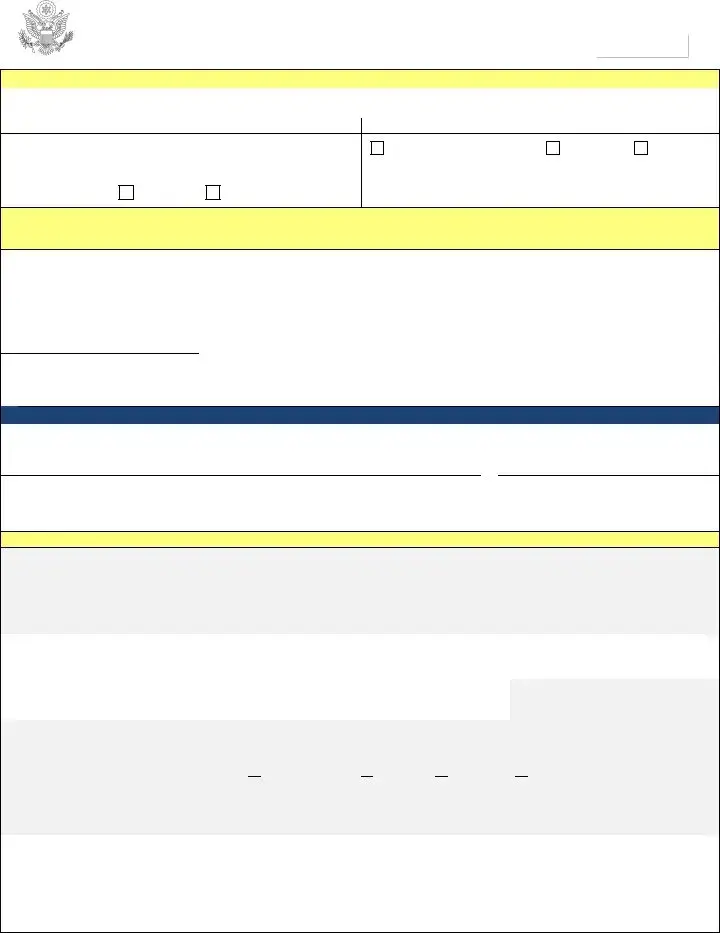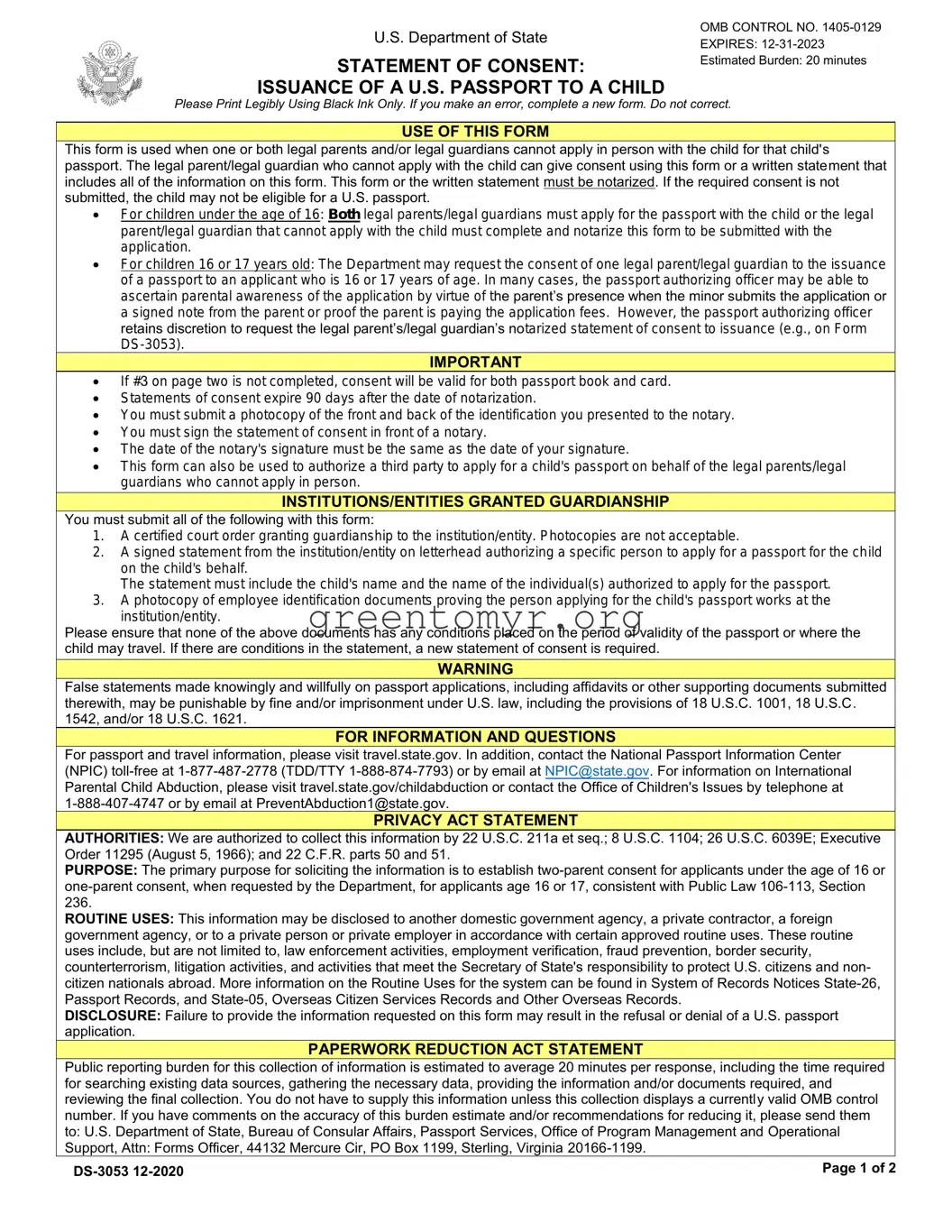|
U.S. Department of State |
OMB CONTROL NO. 1405-0129 |
|
EXPIRES: 12-31-2023 |
|
|
|
STATEMENT OF CONSENT: |
Estimated Burden: 20 minutes |
|
|
|
ISSUANCE OF A U.S. PASSPORT TO A CHILD |
|
Please Print Legibly Using Black Ink Only. If you make an error, complete a new form. Do not correct.
USE OF THIS FORM
This form is used when one or both legal parents and/or legal guardians cannot apply in person with the child for that child's passport. The legal parent/legal guardian who cannot apply with the child can give consent using this form or a written statement that includes all of the information on this form. This form or the written statement must be notarized. If the required consent is not submitted, the child may not be eligible for a U.S. passport.
For children under the age of 16: Both legal parents/legal guardians must apply for the passport with the child or the legal parent/legal guardian that cannot apply with the child must complete and notarize this form to be submitted with the application.
For children 16 or 17 years old: The Department may request the consent of one legal parent/legal guardian to the issuance of a passport to an applicant who is 16 or 17 years of age. In many cases, the passport authorizing officer may be able to ascertain parental awareness of the application by virtue of the parent’s presence when the minor submits the application or a signed note from the parent or proof the parent is paying the application fees. However, the passport authorizing officer retains discretion to request the legal parent’s/legal guardian’s notarized statement of consent to issuance (e.g., on Form DS-3053).
IMPORTANT
•If #3 on page two is not completed, consent will be valid for both passport book and card.
•Statements of consent expire 90 days after the date of notarization.
•You must submit a photocopy of the front and back of the identification you presented to the notary.
•You must sign the statement of consent in front of a notary.
•The date of the notary's signature must be the same as the date of your signature.
•This form can also be used to authorize a third party to apply for a child's passport on behalf of the legal parents/legal guardians who cannot apply in person.
INSTITUTIONS/ENTITIES GRANTED GUARDIANSHIP
You must submit all of the following with this form:
1.A certified court order granting guardianship to the institution/entity. Photocopies are not acceptable.
2.A signed statement from the institution/entity on letterhead authorizing a specific person to apply for a passport for the child on the child's behalf.
The statement must include the child's name and the name of the individual(s) authorized to apply for the passport.
3.A photocopy of employee identification documents proving the person applying for the child's passport works at the institution/entity.
Please ensure that none of the above documents has any conditions placed on the period of validity of the passport or where the child may travel. If there are conditions in the statement, a new statement of consent is required.
WARNING
False statements made knowingly and willfully on passport applications, including affidavits or other supporting documents submitted therewith, may be punishable by fine and/or imprisonment under U.S. law, including the provisions of 18 U.S.C. 1001, 18 U.S.C. 1542, and/or 18 U.S.C. 1621.
FOR INFORMATION AND QUESTIONS
For passport and travel information, please visit travel.state.gov. In addition, contact the National Passport Information Center (NPIC) toll-free at 1-877-487-2778 (TDD/TTY 1-888-874-7793) or by email at [email protected]. For information on International Parental Child Abduction, please visit travel.state.gov/childabduction or contact the Office of Children's Issues by telephone at 1-888-407-4747 or by email at [email protected].
PRIVACY ACT STATEMENT
AUTHORITIES: We are authorized to collect this information by 22 U.S.C. 211a et seq.; 8 U.S.C. 1104; 26 U.S.C. 6039E; Executive Order 11295 (August 5, 1966); and 22 C.F.R. parts 50 and 51.
PURPOSE: The primary purpose for soliciting the information is to establish two-parent consent for applicants under the age of 16 or one-parent consent, when requested by the Department, for applicants age 16 or 17, consistent with Public Law 106-113, Section 236.
ROUTINE USES: This information may be disclosed to another domestic government agency, a private contractor, a foreign government agency, or to a private person or private employer in accordance with certain approved routine uses. These routine uses include, but are not limited to, law enforcement activities, employment verification, fraud prevention, border security, counterterrorism, litigation activities, and activities that meet the Secretary of State's responsibility to protect U.S. citizens and non- citizen nationals abroad. More information on the Routine Uses for the system can be found in System of Records Notices State-26, Passport Records, and State-05, Overseas Citizen Services Records and Other Overseas Records.
DISCLOSURE: Failure to provide the information requested on this form may result in the refusal or denial of a U.S. passport application.
PAPERWORK REDUCTION ACT STATEMENT
Public reporting burden for this collection of information is estimated to average 20 minutes per response, including the time required for searching existing data sources, gathering the necessary data, providing the information and/or documents required, and reviewing the final collection. You do not have to supply this information unless this collection displays a currently valid OMB control number. If you have comments on the accuracy of this burden estimate and/or recommendations for reducing it, please send them to: U.S. Department of State, Bureau of Consular Affairs, Passport Services, Office of Program Management and Operational Support, Attn: Forms Officer, 44132 Mercure Cir, PO Box 1199, Sterling, Virginia 20166-1199.
DS-3053 12-2020 |
Page 1 of 2 |

|
U.S. Department of State |
OMB CONTROL NO. 1405-0129 |
|
EXPIRES: 12-31-2023 |
|
|
|
STATEMENT OF CONSENT: |
Estimated Burden: 20 minutes |
|
|
|
|
|
ISSUANCE OF A U.S. PASSPORT TO A CHILD |
|
|
|
|
|
RESET |
|
|
Please Print Legibly Using Black Ink Only. If you make an error, complete a new form. Do not correct. |
|
|
|
|
|
|
1.CHILD’S NAME (As it appears on form DS-11, Application for a U.S. Passport)
Last |
|
|
First |
|
|
Middle |
|
2. CHILD’S DATE OF BIRTH (mm/dd/yyyy) |
|
|
3. THIS CONSENT IS VALID FOR A: |
|
|
Passport Book and Card |
Book Only |
Card Only |
|
|
|
4a. IS CHILD UNDER 16 YEARS OLD? |
|
4b. IF YES, PRINT NAME OF ADULT APPLYING WITH CHILD |
Yes |
No |
|
|
5.STATEMENT OF CONSENT To be completed by the legal parent/legal guardian who cannot apply with the child. The legal parent/legal guardian who cannot apply with the child must complete the information below. This statement expires 90 days after the date of notarization.
I, |
|
, give my consent to the issuance of a United States passport to the minor child |
|
Print Name of Legal Parent/Legal Guardian |
|
(who cannot apply in person with the child) |
named on this application. My consent is unconditional with regards to passport validity and travel.
|
Street Address |
|
Apt# |
|
|
City |
|
State |
|
Zip Code |
( |
) |
|
|
|
|
|
|
|
|
|
|
|
|
|
|
|
Area Code |
Telephone Number |
|
|
|
|
Email Address |
|
|
STOP! YOU MUST SIGN AND DATE BELOW IN FRONT OF A NOTARY.
OATH: I declare under penalty of perjury that all statements made in this supporting document are true and correct.
Signature of Legal Parental/Legal Guardian (who cannot apply in person with the child) |
Date (mm/dd/yyyy) |
IMPORTANT: You must submit a clear photocopy of the front and back of the identification you presented to the notary. The date you sign the form must be the same date that the notary signs the form.
6. FOR COMPLETION BY NOTARY
On the date specified above and below, the affiant listed above, who is not related to me, personally appeared before me and is known to me to be the person whose name is subscribed to and acknowledged that he/she executed the same for the uses and purposes therein contained. I have properly verified the identity of the affiant by personally viewing the below notated identification document and matching photocopy.
Name of Notary
|
Print Name (Notary Public) |
|
|
|
|
|
|
Location |
|
|
|
|
|
|
|
|
City, State |
|
|
|
|
|
|
|
|
|
NOTARY |
|
Commission Expires |
|
|
|
SEAL |
|
Date (mm/dd/yyyy)
Identification Presented by Legal Parent/Legal Guardian: (who cannot apply in person with the child)
Legal Parent/Legal Guardian ID Number:
|
|
|
|
|
|
|
Issue Date (mm/dd/yyyy): |
|
Expiration Date (mm/dd/yyyy): |
|
|
Signature of Notary |
|
|
Date of Notarization: |
|
|
|
|
|
|
|
|
|
DS-3053 12-2020 |
Page 2 of 2 |




 Driver’s License
Driver’s License  Passport
Passport  Military ID
Military ID 
 Other (specify)
Other (specify)